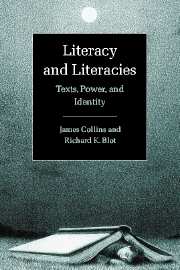Book contents
- Frontmatter
- Contents
- List of figures
- Foreword by Brian V. Street
- Preface
- Acknowledgments
- 1 Introduction: texts, power, and identity
- 2 The literacy thesis: vexed questions of rationality, development, and self
- 3 Situated approaches to the literacy debate
- 4 Literacies and power in modern nation states: Euro-American lessons
- 5 Literacies and identity formation: American cases
- 6 Literacy, power, and identity: colonial legacies and indigenous transformations
- 7 Conclusion: literacy lessons – beginnings, ends, and implications
- Notes
- References
- Index
- Studies in the Social and Cultural Foundations of Language
7 - Conclusion: literacy lessons – beginnings, ends, and implications
Published online by Cambridge University Press: 22 September 2009
- Frontmatter
- Contents
- List of figures
- Foreword by Brian V. Street
- Preface
- Acknowledgments
- 1 Introduction: texts, power, and identity
- 2 The literacy thesis: vexed questions of rationality, development, and self
- 3 Situated approaches to the literacy debate
- 4 Literacies and power in modern nation states: Euro-American lessons
- 5 Literacies and identity formation: American cases
- 6 Literacy, power, and identity: colonial legacies and indigenous transformations
- 7 Conclusion: literacy lessons – beginnings, ends, and implications
- Notes
- References
- Index
- Studies in the Social and Cultural Foundations of Language
Summary
This development, coupled with that of anthropology and of the history of writing, teaches us that phonetic writing, the medium of the great metaphysical, scientific, technical, and economic adventure of the West, is limited in space and time and limits itself even as it is in the process of imposing its laws upon the cultural areas that had escaped it.
(Derrida, 1976a, p. 10)It's our cultural fears – of internal decay, of loss of order, of diminishment – that weave into our assessments of literacy and scholastic achievement.
(Rose, 1989, p. 7)Introduction
In the preceding chapters we have engaged with a number of complex conceptual issues concerning literacy, in particular those of text, power, and identity, and we have developed our arguments via a wide range of ethnographic and historical cases. What we wish to do at this point is revisit certain of those issues, developing arguments and questions further, making connections between chapters, cases, and conceptual positions. That is, and against convention, we will try to make this conclusion an opening as much as a closing. Because the theme of the “origins” of literacy continues to fascinate both scholarship and popular culture, we will return to this topic by means of the Tolowa case with which our book opened. As we examine the late-twentieth-century advent of writing among these Northern California native people, we are brought to issues and questions raised by Derrida about the theme of origins in writing as well as to recent criticisms made by Goody about Derrida's relativist arguments concerning writing, reading, and books.
- Type
- Chapter
- Information
- Literacy and LiteraciesTexts, Power, and Identity, pp. 155 - 176Publisher: Cambridge University PressPrint publication year: 2003

